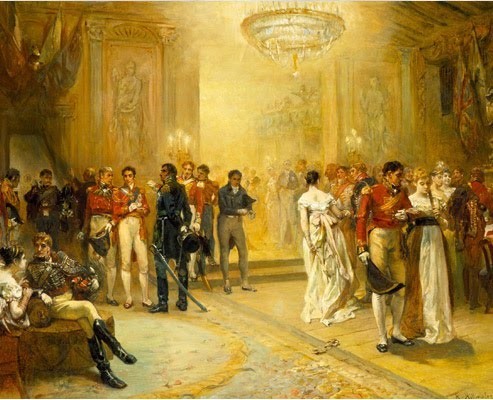 |
A quick study of the men
and women who succeeded Peter makes it even more clear why early Russian history ends with Peter and
modern Russian history starts with Peter.
For all his penchant
for cruelty, there can be no denying that Peter rescued Russia from
centuries of weak leadership and set Russia on a path to glory.
Perhaps the only thing
Peter completely failed at was providing his new Russian Empire with
an adequate male heir to continue his line. However, it wasn't for
lack of trying. He had 15 children in all. Six of his male
heirs died very young and he murdered the seventh... some say with
his own hands.
Peter was survived by
only two children - Anna and Elizabeth. A cursory review of
the Tsars and Tsarinas who followed Peter is very complicated.
1. Catherine (not
Catherine the Great) was Peter's wife. She sat on the throne for
just two years before she too died. A man named Menshikov was
the actual ruler.
2. Peter II was the
young son of Peter the Great's murdered son Alexei. He lasted four
years before dying of smallpox on his wedding day at age 15.
|
3. Anna (not Peter's daughter) ruled for ten years.
Anna was the daughter of Ivan V, the
mentally-challenged man who was Peter the Great's
half-brother. Anna was mentally competent but
very strange. Once she had fire bells rung
throughout St Petersburg just to see the panic.
She was reportedly greatly amused. Anna wasn't
very interested in running the government so she let
her boyfriend Biron take over. Anna's main
goal was making sure her cousin Elizabeth, Peter the
Great's remaining daughter, didn't take her place.
4. Ivan
VI was Anna's nephew. He became Emperor at age
2 months and "ruled" for a year. Actually his mother
was running the show and not very well at that.
|
| |
Tsarina
Elizabeth
Elizabeth Petrovna was
Peter the Great's last surviving child. It was now 1741.
Upon her father's death,
Elizabeth had been passed over in succession because she was too
young. Now at age 32, due to her grace and charm, practically
every noble in Russia deeply preferred her as a leader to the
buffoons currently running the show. So one day Elizabeth decided it
was time to grow up.
At the time, Elizabeth
perhaps enjoyed her life of luxury a bit too much.
Elizabeth was very
popular. Intelligent and charming, Elizabeth was the leading
lady of Russian society as well as one of the great beauties of
Europe. Elizabeth enjoyed the company of handsome men and she
loved to dance and party. She lived a life of ease and found
many ways to amuse herself.
However, at heart
Elizabeth was a patriot.
As she watched the nonsense of an infant running
the Empire and the chaotic state of the Russian government,
Elizabeth put her foot down and said this was ridiculous.
Enough! It
had been 16 years since her father's death and Russia had yet to
have a decent ruler. Her father had not spent his entire life making
Russia great so this Ship of Fools could take over.
Elizabeth took the
throne in 1741 in a highly amusing way. Elizabeth, a deeply
religious woman, had been praying all morning for guidance.
From there, she walked over to the headquarters of the Palace Guard
with a metal breastplate over her dress while holding a silver cross
in her right hand.
Elizabeth was very
popular with the guards. The men of the Palace Guard had known
the Princess her entire life. Elizabeth was a very gentle woman who had always
treated these men with kindness and courtesy. Elizabeth was
even godmother to some of their children.
The guards could see
there something
was different about Elizabeth today. The guards had never seen her
look so determined before. They immediately rose to attention.
Smiling, Elizabeth
stated to the shocked men, "Who do you want to serve? Me, the
natural sovereign, or those who have stolen my inheritance?"
The guards took one look
at this incredible beauty, looked at each other & nodded. Yeah, let's pick her!
So with the guards at
her side, Elizabeth walked over to the Palace and announced she was
taking over, so get the hell out of here. The pretenders took
one look at the faces of the men standing behind Elizabeth, then
went and packed their bags. Not a shot was fired. Not a
drop of blood was shed. For that matter, no one had even
raised a weapon. Just like that, Elizabeth became the
Tsarina.
|
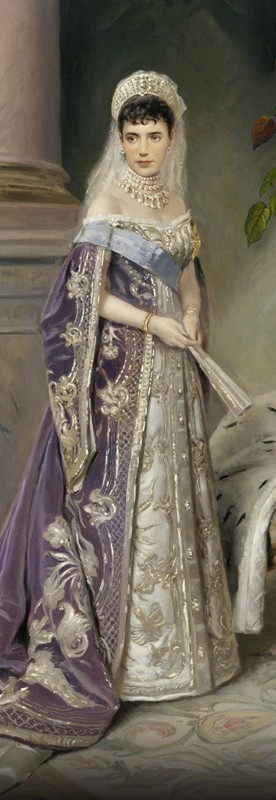 |
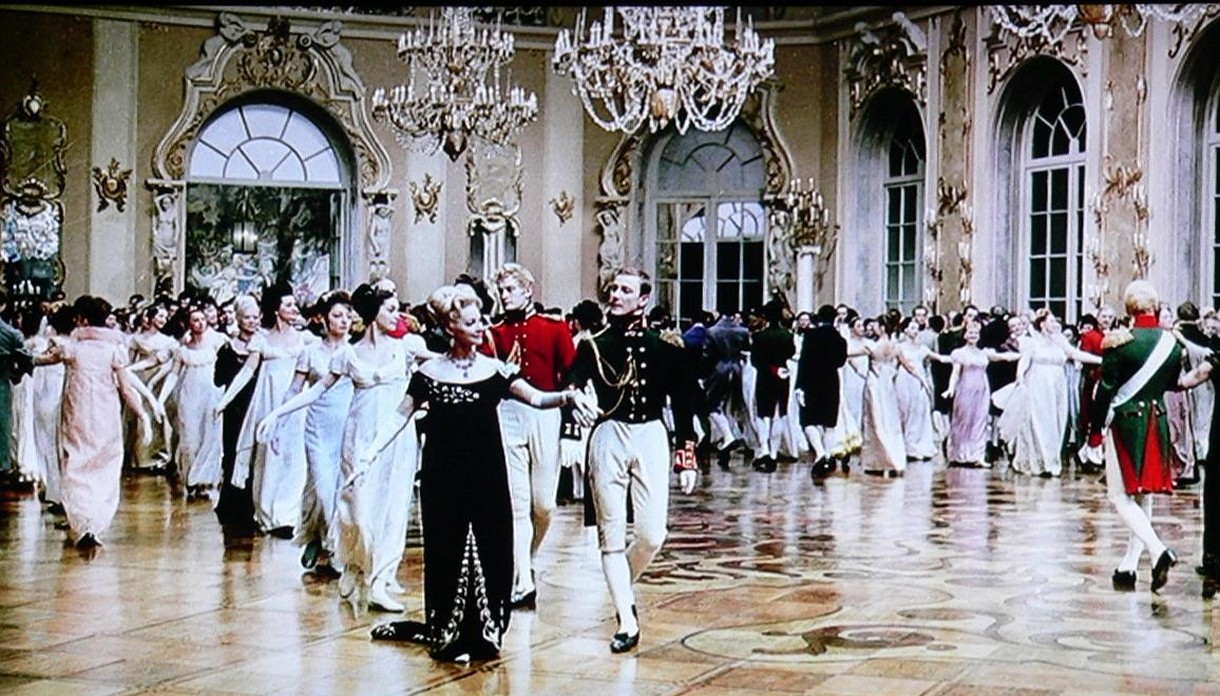 |
The Grand Ball
Elizabeth would reign for 20 years. Elizabeth was definitely
Peter's daughter. She would
prove to be a highly competent ruler in many ways. However,
most people would admit Elizabeth wasn't nearly as interested in
running the affairs of state as she was in throwing a good party.
When it came to dancing and splendor, no one could hold a torch to
Elizabeth.
Perhaps Elizabeth's greatest gift to Russia was bringing a sense of
majesty to the crown. Yes, this impressive
woman had considerable flair. With her beauty and
fondness for dancing, Elizabeth brought the Grand Ball to Russia. Elizabeth's
presence created an
elegance in Russian Court and society that had never been seen before.
Where her father had ruled with force, Elizabeth ruled with style.
|
Perhaps a bit vain,
Elizabeth was said to own 15,000 dresses - none of which she ever
wore twice!
Elizabeth changed
outfits two to six times a day. Definitely a woman.
Under the reign of
Elizabeth, the Russian court was one of the most splendid in all
Europe. Foreigners were amazed at the sheer luxury of the sumptuous
balls and masquerades.
The notorious extravagance of Elizabeth came to define the Court in
many respects. Elizabeth created a
world in which aesthetics reigned supreme, producing a Court in
which a tacit competition existed amongst courtiers to see who could
look best... second only to Her Majesty of course.
Historian Mikhail Shcherbatov stated her court was “arrayed in cloth
of gold, her nobles satisfied with the most luxurious garments, the
most expensive foods, the rarest drinks, that largest number of
servants and they applied this standard of lavishness to their dress
as well.”
|
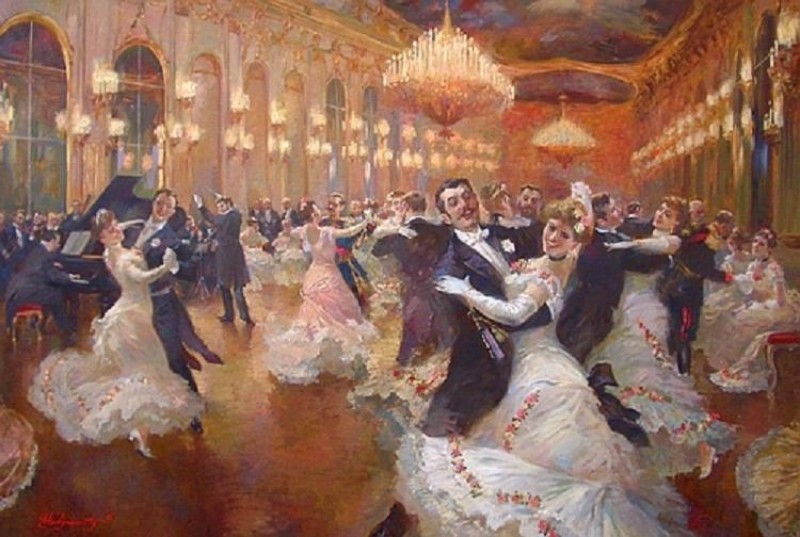 |
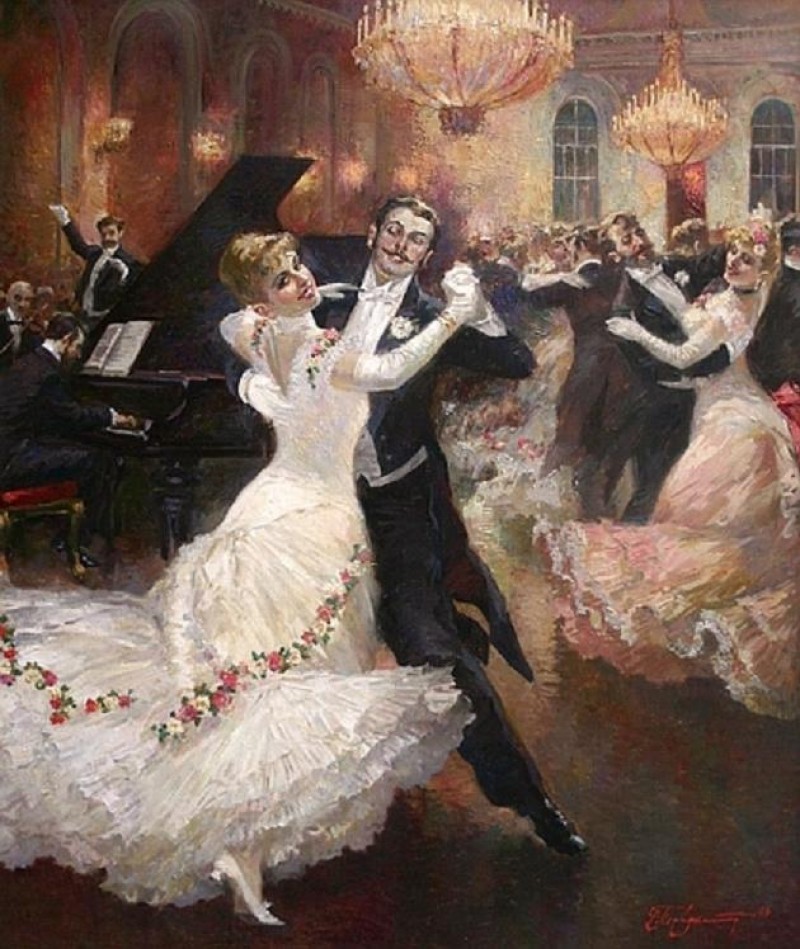 |
It is reported that Elizabeth threw two balls a week. One would be a
large event with an average of 800 guests in attendance, most of
whom were the nation’s leading merchants, members of the lower
nobility, and guards stationed in and around the city of the event.
The other ball was a
much smaller affair reserved for Elizabeth’s closest friends as well
as members of the highest echelons of nobility.
In matters of state,
Elizabeth could be lazy
and perhaps enjoyed luxury a bit too much to attend to her job
daily. Official documents often waited on her desk for months
to be signed.
Nevertheless, in
the eyes of the world, Elizabeth brought prestige to Russia.
Elizabeth did not enjoy taking Russia to war. She would prefer to
serve as the peacemaker.
Fortunately Elizabeth
inherited her father's genius for government, but she definitely had
a style of her own.
While her illustrious
father was best known for his brute force, Elizabeth was known for
her gentleness. She preferred to use diplomatic tact to get her way
Her father had been
known to execute entire towns because one person was said to have
given food to the enemy.
In stark contrast,
Elizabeth never had a single person executed during her reign.
Elizabeth held a vehement opposition to the death penalty.
Elizabeth is best known
for restoring dignity to the Russian crown. It was said of
Elizabeth, "She makes me proud to be a Russian."
Elizabeth goes down in
history as one of her country's most beloved rulers.
|
Catherine
the Great
Born as Sophia Augusta
Fredericka to a Polish prince and Prussian general, the future
Catherine the Great did not have a drop of Russian body in her body.
Sophia was personally
selected by Tsarina Elizabeth to marry Peter III, Elizabeth's nephew
by her deceased sister Anna.
Catherine, as she was
renamed, gave birth to Paul, the future Tsar, in 1754. This
was a joyous event in Russia because it meant that Romanov bloodline
would be continued. Peter the Great had been a Romanov, Anna
was his daughter, Peter III was a grandson, and now baby Paul was a
great grandson.
Only one problem.
In her memoirs, Catherine claimed the father was her lover Sergei
Saltykov. Right there that little tidbit is all the evidence we need
to see that Catherine was a bit out of the ordinary.
Even if it was true,
what sovereign writes, "Oh, by the way, my son the Tsar of Russia is
illegitimate"? Aren't monarchs supposed to appear respectable?
What do you suppose her
son Paul thought when he read that?
The matter of her son's
true father was important. Peter III was the son of Peter the
Great's daughter Anna. Sadly, his mother died in 1728 shortly
after giving birth. Peter, the future Emperor of Russia was
the progenitor of every single 19th-century Romanov ruler all the
way to Nicholas and Alexandra.
That brings up an
interesting question. Did Catherine break the Romanov bloodline with
her self-admitted infidelity? In other words, who's your Daddy?
There seem to be two
lines of thought. Lots of people point out how much Catherine
disliked her son and may have wanted to hurt him.
|
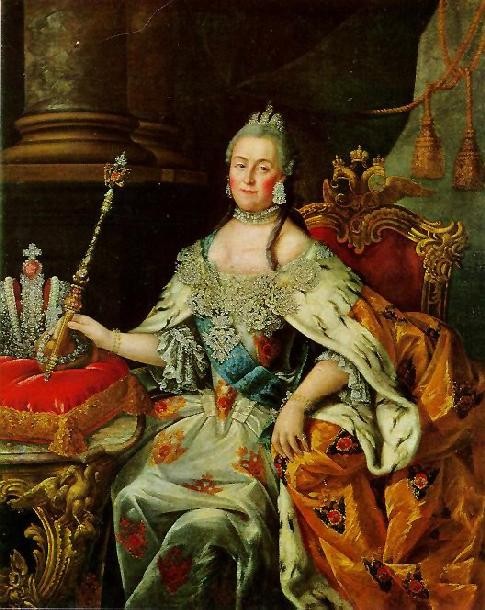 |
These commentators generally add that Catherine's poison pen
notwithstanding, Paul looks more like Peter III than his potential
father Saltykov. Wikipedia states "Paul
does in fact seem to physically resembled the Grand Duke (Peter III)
so one might doubt any claims of illegitimacy."
The other point of view
is more like "So what? At least the kid had some Russian blood
in him along with that Polish whore."
Most modern historians
believe that there is ample evidence that the House of Romanov died
out with Peter the Great's grandson, Peter III. They cite that Peter
Feordorovich (Peter III) sired no children on his mistresses and his
professed revulsion at Catherine makes relations between them
unlikely. His early impotence was known at court, and after
his surgery, sterility was also suspected.
On the other hand, there are four good arguments to the contrary.
First, no one can deny a
resemblance between other Romanovs and Paul. There were also
numerous physical and personality similarities between Paul and
Peter III.
Second, Peter III never
denied paternity. His hatred of his wife was so intense that
had he suspected Paul's being sired elsewhere, he would likely have
denounced Catherine as an adulteress. But he did not.
Third, Catherine's
suggestion of Saltykov's paternity might have been an attempt to
minimize her guilt in Peter III's subsequent murder by her
partisans. If indeed she had her husband killed, she did not want to
give the appearance of murdering the father of her son.
Last, and perhaps most
persuasive, keep in mind that Catherine was one of the world's most
skillful politicians. As a native of Poland, her position in Russia
at the time was shaky at best. With her husband clearly
dissatisfied with her, Catherine's only hope for advancement was to
perpetuate the Romanov dynasty.
Are we to believe this
most ambitious of women would jeopardize her hopes and dreams by not
fulfilling her dynastic function? It seems more likely that
Catherine took care of business, then moved on to look for romance
elsewhere.
Everyone seems to agree
a little genetic testing might be an interesting way to end
speculation, but that has not yet come to pass.
Palace Intrigue
The one thing everyone
seems to agree on is that Catherine was a very
different kind of monarch indeed. Very different.
Hey, we are just getting
started! This woman's middle name was "Scandal".
There are books that
chronicle the stories of twelve different affairs, concluding there
may well be many more yet to be uncovered.
Here we have a perfect
example of the Double Standard. Rumor has it that Peter the
Great took mistresses and visited brothels on a regular basis, but
people just yawn. Catherine has twelve affairs and sets
tongues clucking around the world.
Nevertheless, the
myths and legends about the woman's ribald sex life are be very distracting.
These stories are so
salacious that a reader just sits there slack-jawed. Once they
finally
get to reading about her achievements, they are too tired to pay any attention.
Here's a good example.
Catherine, Polish by birth, first met Peter III at the tender age of
ten. Based on her writings, she claims she found Peter detestable upon meeting
him. She disliked his pale complexion and his fondness of alcohol at
such a young age.
So with that attitude, why
did she marry him? Apparently Catherine's mother was a cold,
scheming, highly ambitious woman who spent her life angling to find
ways to get her daughter on the Russian throne. Elizabeth,
Tsarina of Russia, couldn't stand the woman. However Elizabeth
was very impressed by young Catherine.
Elizabeth allowed her
nephew Peter to marry Catherine for political reasons. It was
a loveless marriage, but apparently so were many other European
marriages. At the time Peter III became Emperor, Catherine had
been married to him for 16 years.
There is quite a bit of circumstantial evidence that Catherine was
involved in a conspiracy to have her husband Tsar Peter III
assassinated.
That's right...
Catherine quite likely had her boyfriend murder her husband.
If you watch the cable
station LMN (short for "Lifetime Murder
your Husband Network"), you realize this sort of stuff
happens a lot more often than most people realize.
But for crying out loud,
this guy was the Emperor of Russia! How do you get away with
murdering the Emperor of Russia? And why isn't this story on cable?
Before we start, surely you lose track of
all the characters, so let's quickly review.
Peter the Great had two
surviving children: Anna (not Empress Anna) and Elizabeth.
While Peter was still alive, Anna married a Swedish prince who lived
in Germany. Anna's son Peter III was born in Germany.
Empress Elizabeth hand-picked Catherine from Poland to be her
nephew Peter III's wife. They were married in 1746.
|
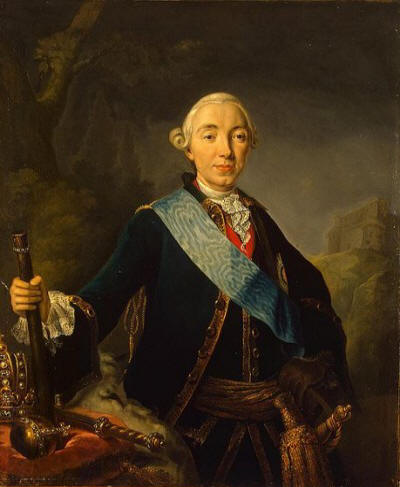 |
|
1762
Anna, Peter's mother had
passed away in 1754. Tsarina Elizabeth died in 1762.
Peter III was about to
take the throne. No one was happy about this. Elizabeth
had been very popular, but Peter III was disliked.
For starters, let's be
clear his wife definitely didn't care for him. Oh no, not by a long
shot. She wasn't the only one. Although Peter III was the grandson of Peter the Great,
none of the Russian nobility cared much for him either.
|
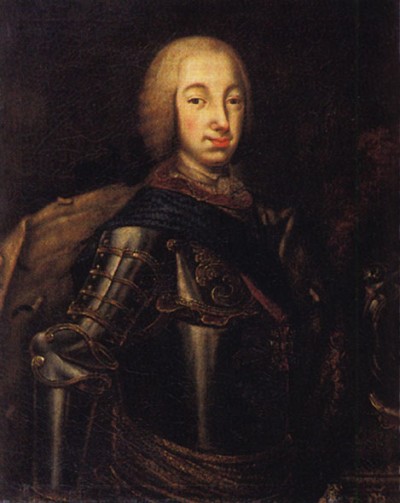 |
Peter III
didn't fit anyone's idea of being "Russian". He had a long list of
shortcomings.
- Peter III was a direct descendent
of Charles XII of Sweden, Peter the Great's bitter rival and enemy
during the Great Northern War.
- Peter III had
German roots and lived there for long stretches of his life.
- Peter III
openly stated he much preferred Frederick the Great, Prussia's
current leader, over Russian leaders as
his hero. Peter was on record talking about how much he
"admired" Frederick. This was a raw wound. Prussia
had been Russia's bitter enemy
during the recently ended Seven Year's War. Frederick was
responsible for many devastating Russian defeats.
- Peter III could not have cared less that he was the grandson
of Peter the Great.
- Peter III
was constantly ridiculed by his ambitious wife Catherine.
She openly stated there were
things "wrong" with Peter III. He was ugly.
He was a pig. He was a deviate.
Catherine
described him as an
“idiot”, “retarded”, “a drunkard from
Holstein”, and a “good-for-nothing
lout”. For good measure, Catherine
also claimed she had never even slept with
the man. Ouch!
Considering Catherine had slept with everyone else in the Russian
Empire, that admission convinced everyone there really was something
wrong with Peter III.
|
For that matter, Peter was said to detest his wife. There was
great animosity between the two of them.
Peter was murdered soon
after he took the throne.
So there does appear to be motive on Catherine's part, yes?
Maybe so, but
Catherine's biography in Wikipedia clearly states:
"Historians
find no evidence for Catherine's complicity in the supposed
assassination."
 |
Oh really? Catherine
probably didn't raise the knife, but c'mon now...
Let's review the
circumstantial evidence.
In February 1762,
Tsarina Elizabeth died. Her nephew Peter III was named
Emperor.
In April 1762,
Catherine gave birth to an illegitimate son. Grigory Orlov,
Catherine's lover, was the
father. He and Catherine had been lovers for some time.
In fact, this was their second illegitimate child. Catherine
had another child the year before.
In July 1762,
six
months into his reign, Peter III was deposed in a bloodless coup. At
the time, Alexei Orlov and none other than his brother Grigory Orlov
(yes, that Grigory Orlov) were directly
involved in the conspiracy.
In August 1762,
Catherine was promoted to Empress. Eight days later, Alexei Orlov
(brother of that Grigory Orlov)
murdered the deposed Tsar in cold blood.
The next sentence in
Wikipedia states:
"Catherine was
cleared of all
complicity in the death
in the supposed
assassination.."
Oh really? Cleared by who?
The same jurors in the OJ Trial? Give us a break.
|
|
Whoever wrote the Wikipedia passage was clearly a Catherine admirer.
For one thing, they called Peter's death a "supposed
assassination"
What is "supposed"
about it? Peter was murdered in cold blood!!
Furthermore, not everyone agrees
that Catherine was innocent.
There are writers who say Catherine initiated Peter's murder for the
oldest reasons in the book - she detested the man and wanted his
throne.
The theory goes that
Catherine spent the rest of her career speaking ill of the dead
Emperor in order to improve her own bad reputation in the affair
among the people of Russia. Guilty conscience perhaps? Draw your own
conclusions.
People
have long been
fascinated with Catherine because she is a prime example of a highly
ambitious woman who would do anything to get to the top. That
included ingratiating herself to Tsarina Elizabeth so that she could
marry Elizabeth's nephew to become a royal. That included murdering
her husband at the right time. That included sleeping with a
lot of men who she promoted to influential positions in government
when she was done with. It helps to have friends in the right
places. What better way to make friends?
|
Considering how she felt
about Peter III, perhaps Catherine's greatest accomplishment was
staying married to the man until it was the right time to get rid of
him.
And how did Catherine cope with her pathetic
marriage? The same way a lot of royals do who are stuck in a
loveless marriage.
What makes Catherine
different though was that she didn't seem
to care who knew about what she was doing. Gossip about Catherine spread
through every court in Europe.
Her affair with Sergei
Saltyov produced Paul, heir to the throne, in 1754.
Her affair with Stanley Poniatowski, the love of her life, produced her
second child in 1757.
Her affair with Grigory Orlov produced the conspiracy that
eliminated the so-called pig husband and produced her third child in 1762.
Considering her list of
illegitimate children and the wild
tales that overshadow the career of Catherine, it seems like much of her
label "Great" was given to her as much for being "interesting" as for
what she accomplished.
Fortunately, Catherine
was almost as good an Empress as she was scandalous. She
reigned for 34 years.
A major part of her
legacy was bringing education and culture to Russia. Similar
to the Elizabethan Era in England, Catherine presided over a Golden
Age of Russian creativity.
The government ran
smoothly and this was a time of great prosperity for
Russia. Catherine had come along at the right time to build on the legacy of Peter the Great.
Under Catherine, Russia continued its rapid climb to become one of Europe's major powers.
|
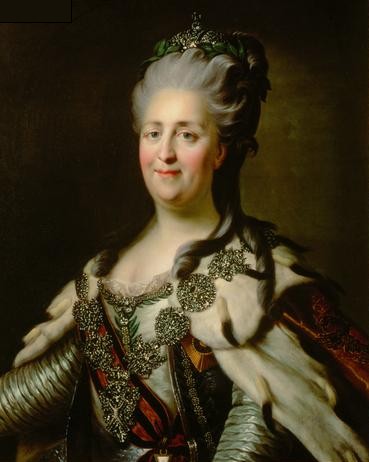 |
|
|
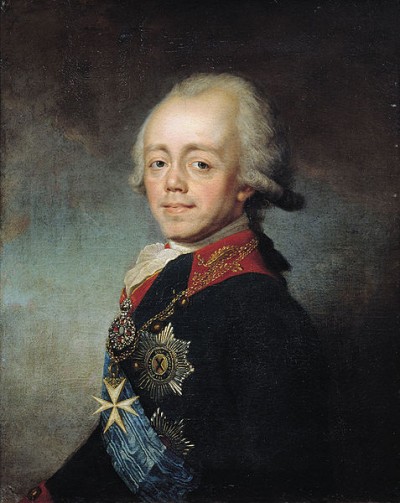 |
Tsar
Paul I
Paul I is one of history's sad figures. Paul lived
his entire life certain that he would die of assassination
like his father Peter III. Paul was right. He was assassinated
in 1801 after serving as Tsar for five
years.
Despite his lonely childhood and the terrible end to
his life, Paul was at least able to enjoy great happiness in
his adult life.
His 1776 marriage to
Princess Sophia Dorothea of Wurttemberg turned out to be an extremely happy marriage.
Maria Feodorovna,
her Russian name, was not only lovely, she was serious and
purposeful. Her feat of royal childbirth - 10 children in a
22 year period - brought her great esteem.
Even better, every single child was healthy and talented.
|
 |
Ten children.
What an incredible blessing! Among the children were
two future tsars -Alexander I and Nikolai I - as well as two
future queens - Catherine of Wurttemberg and Anna of the
Netherlands. The present Dutch royal family is
descended from Anna Pavlovna, who is still greatly loved in
her adopted country.
By all accounts,
Paul
was a good father. His children remembered him
as a tender, nurturing parent.
Paul's death
darkly echoes the sad fate of Peter the Great's son Alexei,
the kid who died of torture. Although the
circumstances of Paul's death are completely different,
Paul's adversarial relationship with his illustrious mother Catherine
set him on the same risky course as Alexei's disrespect for
his father's policies.
Catherine almost
bypassed Paul as her successor in favor of his son Alexander
because she was well aware her son disapproved of many of
her policies. Like Peter the Great, Catherine the
Great wanted things done her way after she was gone.
Catherine had appropriated Paul's first son Alexander
practically from birth. Alexander grew up in Catherine's
household, not Paul's. She made Alexander was her protégé.
Catherine
spent a great deal of time indoctrinating young Alexander in her own image.
Knowing full well
how much Paul disagreed with her, Catherine's
final years were spent trying to figure out a way to
leapfrog past Alexander. Catherine was so pleased with
Alexander's progress that she openly would talk about
skipping her own son and picking Alexander instead.
Unfortunately for Catherine, while Paul tweaked her from
time to time, he never boldly stepped out of line to give
her a reason. Nevertheless, the question of who would
succeed Catherine had much of the same suspense as the
Oscars.
When Catherine
died suddenly in 1996, Paul quickly darted to her bedroom
to see if her last testament had named him or his son to
succeed him. To his surprise, Paul was the winner.
He sighed with great relief.
It was later
said that Catherine was almost certain to name Alexander,
but she putting it off because it upset her so much. The
sudden heart attack felled her before she could force
herself to make the switch.
Interestingly,
Paul was quite prepared to be Tsar. Paul really wanted the job
and for all the right reasons
- to serve the people. Born in 1754 (8 years before
Catherine the Great seized power), Paul had waited 42
years for this opportunity. In addition to being a
good father to his children, Paul had used much of his wait
studying statesmanship. Similar to Peter the Great,
Paul had a natural bent for study. He was owner of
40,000 books. Paul was just as avid a scholar as his
mother had been.
Paul
had all the makings of a knowledgeable leader. An analysis
of his writings shows that Paul was clearer and more precise
than his august mother Catherine. Unfortunately,
his ideas were wasted. Paul was precluded from
practicing what he preached by his mother before he became
tsar... and then the changes he enacted were short-circuited by the nobles who ended his life.
As Catherine suspected he
would, Paul immediately reversed many of his mother's
directions. So what did Paul do that was so horrible?
Paul
contradicted his mother in many ways, but two areas stood
out.
First, Paul
helped the serfs. In fact, he was the Tsar of Russia
version of Robin Hood - steal from the rich and give to the
poor.
Catherine, a
highly educated woman, had spoken greatly of her enlightened
attitudes towards the serfs during her reign. Unfortunately, she never put her
actions behind her words. In fact, she made things
worse. While Catherine caused many ordinary Russians
to be enslaved through serfdom, Paul was the first Russian
tsar to limit the work required of these unfortunate people.
Lurking in the
shadows of Russian society was the horrible fate of the
serfs. Although the serfs were "free" on paper, they
were tied to their landlord's estate for life. The
serfs were no better off than the slaves of the Southern
farmers here in America pre-Civil War. The quality of
the serf's life depended directly on how well or how badly
they were treated by their landlords. When they tried
to escape, they were hunted down in much the same way as
were the negro slaves in America.
During the years
of his apprenticeship to become Tsar, Paul was a model landlord to the
serfs, Russia's most humble people. Paul educated their children, lent them money,
instituted a system of free medical care, gave them more
land for their use, and upgraded agricultural technology.
In Paul's
treatment of the serfs as both tsar and grand duke, he
sought to end their suffering and improve their lives. I n
this, he put into action the Enlightenment ideas parroted by
his mother, but never followed unless it suited her.
Paul's second
action proved to be his undoing. To the nobility, Paul
was a scourge. Paul sought to undo most of the privileges
they had gained under Catherine. Paul may have been
book-smart, but he lacked political savvy. No one
had ever trained him in the ways of politics. Not only
did Paul's
actions alienate the rich, but he had no idea the risk he
was taking.
Catherine never
dispensed a reward or a punishment without carefully
thinking it through. Paul wasn't this cunning.
Furthermore, he let his own need for revenge color his
actions. Blinded by hatred of his mother, and
lacking her as an available target for his rage, the Tsar
struck out instead at the aristocracy. His targets
included many of the people who been Catherine's supporters.
Naturally, these powerful people began to plot against this
tsar who so loved the peasants and so mistrusted the rich.
 |
Plots to remove Paul as
tsar brewed for at least a year before
it took place.
Among the chief
conspirators were Count Pahlen,
the head of the State Police and
Count Zubov,
Catherine's last
lover.
While Pahlen provided the
means to dethrone his tsar due to his control of
strategic offices, the spark for the successful
conspiracy came from the Zubov family.
Zubov used his favorite
status as Catherine's lover as a career opportunity
to advance himself and his family.
Naturally, this was
lost with Catherine's death. Not
trusting him, Paul had put Zubov in captivity in
1797.
The tsar made a tactical
error when he issued a general amnesty in 1800. The
parasitic Zubovs used this chance
to return to the capital. Zubov
immediately went to work plotting his own revenge.
On the night of March 12, 1801, Pahlen, Count
Bennigsen, and the Zubov brothers Nikolai and Platon
entered the Mikhailovski Castle.
They were
able to bypass the Palace Guards thanks to an
insider. The co-conspirator
was an unfaithful aide-de-camp of
Paul's who snuck them through the
doors.
The
conspirators found the tsar's bed
empty. The men were drunk,
but still managed to locate
Paul hiding behind a
screen in his chamber. In
an alcohol-induced frenzy,
they ordered Paul to sign a
document professing he was abdicating the throne.
When he refused,
one of the assassins lost his
temper and struck Paul with a sword. Falling
to the ground, Paul was strangled and trampled to death.
He never had a chance.
|
|
|